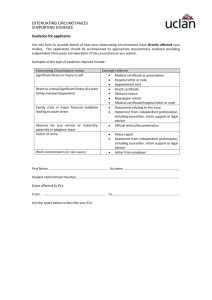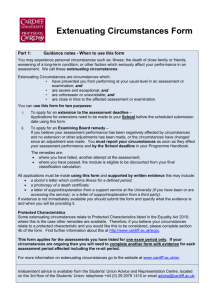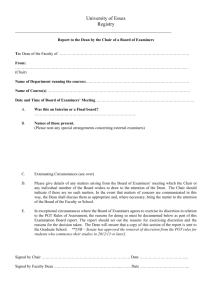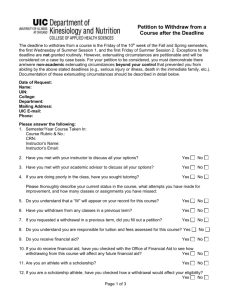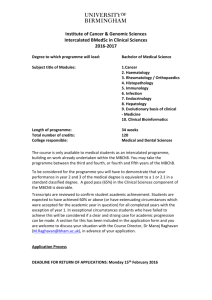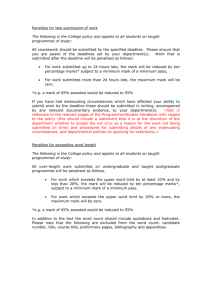Extenuating Circumstances Policy
advertisement
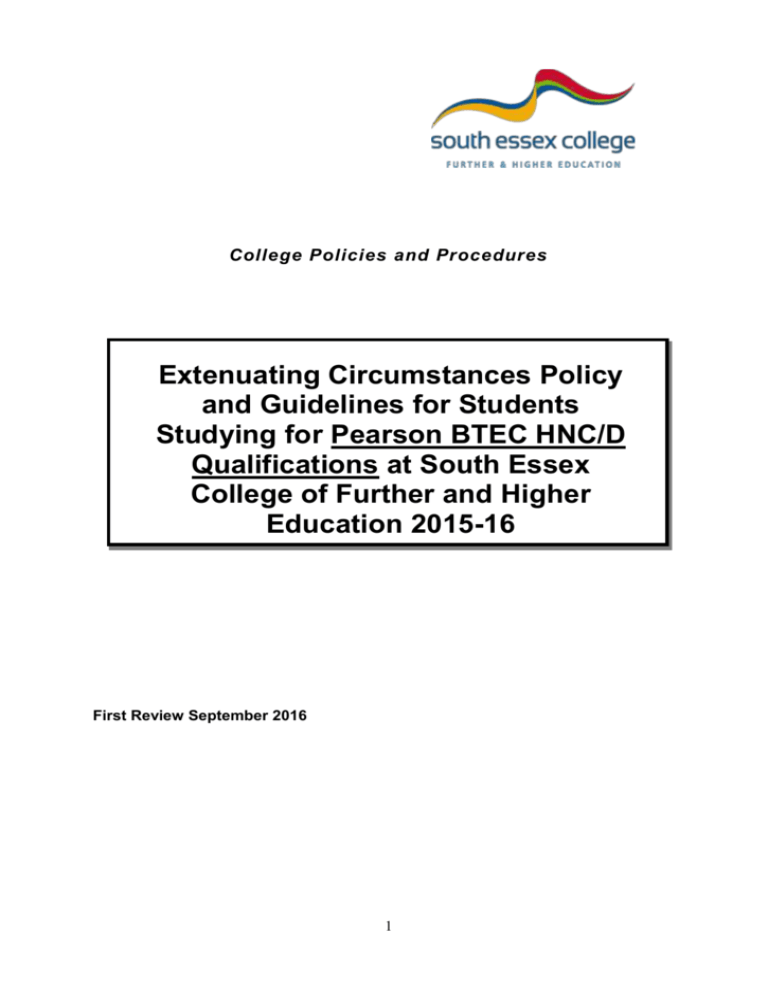
College Policies and Procedures Extenuating Circumstances Policy and Guidelines for Students Studying for Pearson BTEC HNC/D Qualifications at South Essex College of Further and Higher Education 2015-16 First Review September 2016 1 A Introduction Extenuating circumstances (EC) are circumstances beyond your control which cause you to perform less well in your assessments than you might have expected. In general, extenuating circumstances will be of a medical or personal nature that affect you for any significant period of time and/or during the assessment period. It is important to realise that only the most serious extenuating circumstances will have any significant impact on your overall performance. Therefore, the Assessment Board is unlikely to take any action unless it believes that the extenuating circumstances have had a material effect on your academic performance. The Assessment Board can only make judgements about the impact of extenuating circumstances in light of evidence of your academic ability demonstrated in nonaffected work. Boards cannot make judgements about your potential to have gained a higher grade if there is no evidence in the rest of your performance to support this. Furthermore, unless it appears that the extenuating circumstances have had a material affect on your results, the Assessment Board is unlikely to take any action. You should therefore consider this carefully before submitting a form (see also how the Board assesses extenuating circumstances claims). There are three categories of EC claims which are provided (see Appendix 1 for information): A: acceptable reasons for claim with required evidence; B: reasons for claim that may be considered (with additional evidence); C: reasons that we would normally consider as unacceptable. B How do I inform the Assessment Board? It is your responsibility to inform the Assessment Board about extenuating circumstances. You can do this by completing an extenuating circumstances form which will be considered by an Extenuating Circumstances panel who will then make recommendations to the Assessment Board regarding the effect your circumstances have had on your performance (including non-submission of work). Although you may have previously discussed your difficulties with staff in your department, this does not in itself constitute the submission of extenuating circumstances. You must formally submit an extenuating circumstances form for the Assessment Board to consider; informal notification will not be considered by the Board. You need to complete an extenuating circumstances form which must be returned to the location stated above by the published deadline. We cannot guarantee that forms submitted after this date will be referred to the Extenuating Circumstances Panel or sent directly to the Assessment Board. It is essential to inform the Board of any extenuating circumstances before it meets because you cannot subsequently appeal against any decision of the Assessment Board on the grounds of extenuating circumstances if you could reasonably have been expected to inform the Board in advance. It is also your responsibility to explain 2 fully the impact of extenuating circumstances on your work. If you do not sufficiently explain their impact then you cannot subsequently appeal and ask the Board to consider additional information Claims should be submitted as soon as possible after the circumstance(s) occurred and by the deadline. These deadlines are given on the form and in the Assessment Year Planner available in your Handbook and on the website under HE policies and procedures. http://www.southessex.ac.uk/higher-education/higher-education-policies All claims for extenuating circumstances must be anonymous and students must use their ID number. Extenuating Circumstances Form must be sent to Head of Higher Education, South Essex College, Luker Road, Southend on Sea, Essex SS1 1ND.Forms can be emailed to HEextcircs@southessex.ac.uk.These will be date stamped when received and a receipt will normally be sent to your College email account within 10 working days of receipt. C What is an Extenuating Circumstances Panel? All decisions on action to be taken on claims for extenuating circumstances are the responsibility of the Assessment Board for the programme of study. Recommendations for action are made to the Assessment Board by an Extenuating Circumstances Panel. The Extenuating Circumstances Panel membership normally comprises Head of HE, Information Services Manager (Higher Education), a representative from Student Support Services. All members must be independent of the programme of study of the claimant. The Extenuating Circumstances Panel will consider extenuating circumstances relating to assessment performance, the non-submission of coursework and other extenuating circumstances affecting the academic year. The panel will make appropriate recommendations to the Assessment Board. The Extenuating Circumstances Panel will normally meet monthly during the academic year. The Extenuating Circumstances Panel may request additional supporting evidence, where not provided fully, and will categorise the extenuating circumstances as follows: Extenuating circumstances which are sufficiently serious to make a decision to defer an assessment (Categories A and B); Extenuating circumstances which are not deemed sufficiently serious to make a deferral of assessment appropriate (Category C). D How much information do I need to include? You should include on the form details of specific coursework, practical or tests affected by your extenuating circumstances. Make sure you explain the impact these circumstances had on your performance. It is not the role of the Assessment Board to try to work this out or to seek further information on your behalf. Make your submission clear and concise. Remember that Extenuating Circumstances Panel and 3 the Assessment Board are trying to determine whether the circumstances are likely to have significantly affected your academic performance. E What documentary evidence do I need to provide? See guidance provided in the appendix 1 on evidence required for extenuating circumstances claims. You are required to submit documentary evidence to support claims of a medical or non-medical nature relating to absence from examinations/invigilated tests, or related to an individual coursework assignment. It is your responsibility to get this evidence as the College will not seek it on your behalf. A Medical Evidence Pro-forma is attached to the form for you to use if, having read the following guidelines and appendix, you believe that you need to supply medical evidence to support your claim. Timed Assessment If you miss an timed assessment or an invigilated test due to illness or are claiming to have been affected by medical problems during your assessment, you must seek medical attention on the day or as near to it as possible, and you must submit documentary evidence. The evidence must relate specifically to the time of the illness and must make it clear that you were medically unfit to take the assessment. Coursework You are required to submit documentary evidence to support claims of a medical or non-medical nature. In many cases the Assessment Board may judge that a shortterm or minor illness has not had a significant effect on your overall performance. Serious or long-term illnesses affecting coursework If you have been receiving treatment for a serious or long-term medical condition which you believe has seriously affected your work over a prolonged period, you must submit appropriate evidence. You should be able to obtain evidence from your doctor using the Medical Evidence Pro-forma. F What circumstances are NOT taken into account? See guidance provided in the appendix on unacceptable reasons for extenuating circumstances claims. It is not possible to list every circumstance that the Assessment Board would not accept or take into account. However some of the more obvious examples are listed below: claims submitted after the deadline, unless there are good reasons why this is the case. general pressure of work is not taken to be circumstances beyond your control, as you are expected to plan your work schedule a short-term problem or illness which has occurred during the year and which is not deemed to have had an overall effect on your performance 4 personal disruptions or events which could have been anticipated; such as holidays, weddings, changing address or employment, religious holidays or festivals which are usually known in advance excessive demands on time or pressure of one’s employment, which could have been anticipated financial constraints commonly experienced by students missing an examination practical because you misread the timetable or overslept having more than one examination / practical on the same day or on consecutive days (unless you were already suffering from illness or injury) where extenuating circumstances have affected you throughout your time at College it is difficult to determine what your marks might have been like otherwise. In such cases, the Assessment Board is unlikely to take any action G What is an Assessment Board ? The Assessment Board will receive the recommendation from the Extenuating Circumstances Panel in respect of submitted extenuating circumstances. The Assessment Board will consider the decision(s) advised by the Extenuating Circumstances Panel and discuss appropriate action in respect of the students. H How are extenuating circumstances judged by an Assessment Board? The Assessment Board will try to determine whether, and to what extent, extenuating circumstances have affected your academic performance, and determine what action, if any, can be taken. In assessing the significance of extenuating circumstances, Boards will normally take into account: the severity of the problem and the length of time involved; any supporting documentary evidence; whether all work in the same period appears to have been equally affected; whether it is possible to gauge the effect of the extenuating circumstances upon academic performance; whether your achievement is consistent with past performance; the type of assessment affected, and how long you had to complete the work (i.e. date when work set and deadline for submission). Boards cannot estimate what your grade might have been. I What action can the Assessment Board take? The Assessment Board will try to ensure a fair result based on your overall performance. It could take a number of actions as follows:The Board will either agree or discuss the recommendations of the Extenuating Circumstances Panel or discuss a particular case in detail as necessary at their meetings. Discussion will normally be brief and concentrated on those cases that require further careful consideration, usually because the extenuating circumstances may have adversely affected the student’s final unit grade. 5 If the Assessment Board accepts the extenuating circumstance(s) , the mitigation will normally be permission for the student to be assessed in the work in question as if for the first time. Such a student is deemed “Deferred”. If the student fails the deferred assessment, any re‐assessment will be in accordance with current College Regulations J What action will not be taken by Assessment Board ? a) Permit a student who presents extenuating circumstances to proceed to the next year of study if he or she has not met the necessary requirements, unless the examiners are satisfied that it is appropriate to do so on academic grounds; b) Permit students to fail a core unit or fail any published variations to the rules of assessment; c) Annotate statement of results/transcripts with comments about the existence of extenuating circumstances. K False Claims You should note that submitting a false claim or false documentation is a serious matter and would be regarded as an attempt to gain unfair advantage. This would be an academic offence and would be dealt with under the Academic Offences Procedures. The College reserves the right to check on the validity of the document (s) you submit by contacting the third party directly. L Data Protection Act 1998 By submitting an extenuating circumstances form you are agreeing to the College holding this personal data for the purposes of processing your claim. The College will hold this data in accordance with its notification under the Data Protection Act 1998. M Equality Act 2010 If you find that you are unable to submit a hard copy of the Extenuating Circumstances Form, you can submit it electronically. You should submit the form and evidence by the published deadline to HEextcircs@southessex.ac.uk. If you have any queries about a claim which has been rejected, please contact your department to request further information. You can also discuss this feedback with staff in HE Student Support Services if you believe that your individual needs have not been understood or adequately taken into account. If you are providing information about your disability on your extenuating circumstances form, please note that this does not count as disclosure to the College as these forms are intended for use only by the Assessment Board. We strongly urge you to disclose any persistent medical condition, specific learning difficulty or disability to Student Services. 6 N Where can I get more guidance? If after having read these notes you feel you need more help in putting forward your extenuating circumstances, you should contact HE Student Support Services. If you require feedback on the way in which the Assessment Board has handled your extenuating circumstances claim, you can ask for feedback after the results have been released by contacting your department or Student Services. 7 Appendix 1 Extenuating Circumstances Categories The following guidance has been produced to help clarify what can be accepted as extenuating circumstances and the evidence required to support a claim. There are three categories, (A, B and C) set out below that should be consulted before completion of an Extenuating Circumstances Form, available from the College website. http://www.southessex.ac.uk/higher-education/highereducation-policies Category A: Acceptable reason for claim Category A lists reasons that normally will be considered as acceptable reasons for submitting an extenuating circumstances claim and the appropriate evidence required to support the claim. Category B: Reasons for claim that may be considered Category B lists reasons that that may be considered as acceptable reasons for extenuating circumstances and the appropriate evidence required to support the claim. Category C: Unacceptable reasons for claim Category C lists reasons that would normally be considered as unacceptable reasons for extenuating circumstances. Reason for EC Claim: Category A: Acceptable reason Serious Medical Condition Serious personal injury, medical condition or mental health difficulty preventing attendance or completion of assessment or submission of work Category A: Category B: Evidence required Reasons that may be considered Written evidence Serious injury or from a registered illness to child, medical practitioner partner or close relative (parent) Category B: Category C: Evidence required Unacceptable reason Written evidence of Ongoing medical impact to claimant conditions, from registered disabilities, learning medical practitioner difficulties or mental health conditions, for Serious worsening which the student is or acute episode of already receiving an ongoing medical reasonable and condition, mental appropriate 8 health difficulty or disability adjustments unless there is evidence of this condition worsening or ‘flaring up’ Minor illnesses or injuries (such as colds, headaches, hay fever) Bereavement Trauma Death death of close relative/significant other (of a nature which, in an employment context, would have led to an absence in accordance with the compassionate leave regulations) Written evidence from a professional such as Undertaker, Coroner or Registrar Death of close relative (not identified in Category A) or friend Victim of serious crime (e.g. assault, sexual assault, mugging) Written Family breakdown corroboration of (such as divorce) reported crime from Police or other investigating authority Evidence identified in Category A AND Written evidence of impact to claimant from registered medical practitioner OR Death Certificate Theft of work/computer equipment/materials Written evidence required for from registered assessment medical 9 Evidence from Solicitor AND/OR Minor crime Financial problems or Written evidence of employment impact to claimant difficulties from registered Accommodation medical practitioner problems or house moves Direct experience of terrorist incident or natural disaster practitioner, Police, Fire service or University Department (Estates) General domestic / family problems Assessment/Test stress Major fire in residence Caring Responsibilities Court Attendance Miscellaneous Jury service or attendance at court or tribunal as a witness, defendant or plaintiff Unexpected caring responsibilities caused by sudden serious illness or worsening of ongoing medical condition to child, partner or close relative Written evidence from patient’s registered medical practitioner AND Written evidence of impact to claimant from registered medical practitioner Ongoing caring responsibilities Serious disruption caused by terrorist incident or natural disaster Evidence of serious disruption to travel or other plans preventing attendance at or completion of assessment or submission of work AND/OR written evidence of impact to claimant from Any circumstances which have not clearly impacted on academic performance or do not clearly relate to the timing of the assessment Caring responsibilities for minor illnesses, accidents or injuries Official correspondence from Court or Tribunal Authority 10 Visa problems registered medical practitioner Failure of IT equipment or poor working practises – failure to back up work for example. Minor private or public transport failure, holidays or booked travel arrangements Not realising/remembering dates of deadlines 11
